Expectations can sometimes make all the difference when you’re visiting a place for the first time, and that certainly seems to be true from our experience at Arundells during our long weekend break in Salisbury. We made the happy mistake of not reading up about the place before we visited, choosing only to take a look simply because it was very close to Salisbury Cathedral and in a small row of other museums; a perfect chance to eat up some time during the cultural part of our day (before the drinking part that always follows, of course).
First impressions were very good, involving a friendly chat with the woman on reception who took our money, asked if we’d been before, and absolutely gushed with barely-hidden praise for what we were about to see. This was an attitude that would be shared by all the people we encountered in the house during our visit. Everyone really liked working there, and you could tell.
So, we didn’t know anything about Arundells except that it had been the family home of former British Prime Minister, Sir Edward Heath. His leadership of the Conservative Party was a bit before our time (well, technically it coincided with our time, but we were more interested in playing in dirt and with toys than politics back then, and would probably rather that were still the case now), and, being a Tory, that meant he was, in our eyes, absolute scum. Why should we want to know anything about him? Why should we really care about his house and gardens? Well… it turns out that he was one of the good ones. Better ones, at least. He wasn’t a complete self-serving, outright racist, thieving, nasty, traitorous shit like all the present batch and anyone who supports them is what I’m really getting at here. He couldn’t have been too bad a chap, as Tony Benn was a close friend of his, although read the final paragraph of this post for a small caveat here.
From the reception block, a short walk and into the house.
Arundells dates from the late thirteenth century. Its history before Heath called it his home includes spells as a medieval canonry, home to lay tenants of the Cathedral, both a boys and a girls boarding school at different times, and as a book and wool store during the Second World War. Post-war, Arundells fell into disrepair and was in danger of being demolished before being bought and renovated. Then, in 1985 it was bought by the former Prime Minister who hired an interior designer to modernise the house while paying respect to its origins. Display cabinets and furniture were designed for the house at the same time, and many of these pieces are still there now, housing art, collectibles, and gifts from Heath’s interesting life.
Wandering around the ground floor rooms we got to see his yachting memorabilia, his Steinway piano, photos of celebrities and dignitaries, artwork by Winston Churchill and L.S. Lowry, Tang and Ming dynasty pieces, gifts from Mao Zedong, and lots of original political cartoons. It was here that I first started to get the impression that unlike the modern Tory’s xenophobic stance that is designed to shield corruption and incompetence and theft of public money from the average voting imbecile, Heath had a far more cooperative, international viewpoint. This would be confirmed when we headed upstairs.
Heath’s military and political history was spelled out on the first floor, rather than simply implied on the more home-like lower level. As someone interested in politics prior to World War II, his views were at odds with the Conservative-led government’s, despite being Conservative himself. He was opposed to Franco in Spain (his car had been machine-gunned while in Spain in 1938, and his hotel had been bombed by Franco’s forces so you can see how that might have an impact), and was at the Nuremberg Rally in Germany in 1937 where he was appalled by what he saw there and repulsed by meeting Göring, Goebbels, and Himmler, the lattermost of whom he described as “the most evil man I have ever met.” Heath was therefore opposed to appeasement, and in 1941 was called up to service. He was given a commission as second lieutenant in the Royal Artillery, and temporarily commanded a battery that provided artillery support in France and Germany in the final years of the war. Though he didn’t personally kill anyone, he was in charge of a firing squad that executed a Polish soldier convicted of rape and murder, and he witnessed the results of the devastation of war at first hand which helped to cement his political world views.
While leader of the opposition in 1968 it was decision to immediately sack Nigel Farage’s wank material poster boy, Enoch Powell, following the revolting “rivers of blood” speech. Promoting the free market and closer ties to Europe as a means to get out of the country’s terrible economic situation against the Labour view of the time that this was simply reactionary, Heath led the Tories to election victory, and in 1973 brought the UK into Europe. How times and Tories change.
However, it wasn’t all good. Support for Pinochet in Chile, support for bombings by the US in Hanoi, Bloody Sunday in Northern Ireland and the introduction of internment there, were just some of the “Ah, now, that could have been handled better” moments of his political career. These all led to an early election in 1974, the inconclusive result of which was a minority Labour government, before Margaret Thatcher could rise to power. Heath sat on the left side of the right-wing Tories and maintained a poor relationship with Thatcher throughout the rest of his and her lives, so that’s some small comfort.
“Make sure you go down to the end of the garden,” we’d been told in reception, and by one of the people in the house, so after we’d enjoyed our look around Arundells far more than we’d been expecting to we headed outside.
It helped with this being such a lovely day to visit Arundells, of course, but there was no disputing that this was a place with a great garden, indeed. At the very bottom of the garden it was possible to see part of the River Avon at the rear, and to look back along the length of the lawn and grounds towards the house and the cathedral beyond that.
And that is Arundells in Salisbury, and a very nice place it is too. We went in without expectations and were richly rewarded by being surprised, impressed, and educated everywhere we went. Learning about Heath was great, since we’d not known anything, although his personal life and some late-in-life accusations about him were obviously not mentioned or referred to anywhere. Understandable, but something you should check out if you feel the urge. One of the nicest aspects of Arundells, though, were the people working there, and a nicer, more committed bunch of museum employees and helpers we’ve yet to meet on our travels.





















































